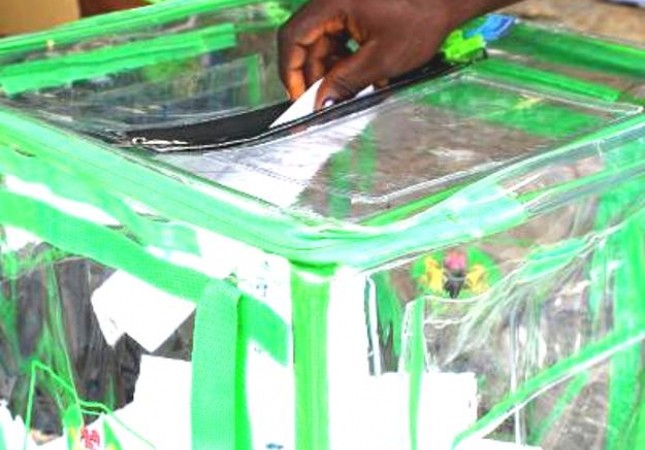A faith-based Civil Society Organisation, Justice, Development and Peace Makers Centre (JDPMC), has called on the Federal Government to track and publish the income and expenditure of all political parties in the last general elections.
Rev. Fr. Peter Akinkunmi, General Coordinator, JDPMC, made the call at a news conference on Wednesday in Abuja.
He urged the Federal Government to mandate ICPC and EFCC to carry out detailed tracking of income and expenditure of all political campaigns and publish their findings within three months after the elections.
The Coordinator stressed that the aim was mainly to ensure a level playing ground for all contestants.
Akinkunmi said that campaign finance regulation seeks to ensure beforehand that campaigns and elections do not degenerate into a bazaar or auction in which merely highest bidders win the election.
According to him, it is in this way that the electoral system lays the foundation for a society that resists the undue influence of a few rich individuals and essentially subordinates every private or group interest to the common good.
He said that the JDPMC had been monitoring campaign expenditure of political parties and their candidates ahead of elections at the national and state levels in Nigeria.
Akinkunmi added that the aim of the organisation was to strengthen democracy through monitoring and sharing of the findings in the campaign expenditure of the five most prominent political parties and their candidates in Kogi and Bayelsa states elections.
According to him, this is to provide concrete and credible information for various stakeholders to further strengthen the regulation of campaign financing in Nigeria.
”In Bayelsa state, our monitoring and analysis indicate that All Progressives Congress (APC) spent an estimated sum of ₦301,933,600 on campaign events and advertisement alone.
”96.2per cent of this was spent on campaign events alone. Additional N17,628,000 was estimated to have been spent on vote-buying and the sum of N27,060,000 was spent on party agents on election day.
”Making the estimated total expenditure of APC on campaign and advertisement the sum of N346,621,610.00. This implies that it exceeded the spending limits stipulated by the law by 79.2per cent
”Peoples Democratic Party (PDP) is estimated to have spent ₦338,202,130 on campaign events and advertisement alone. 94.4 per cent of this was spent on campaign events alone.
”An additional N28,634,000 was estimated to have been spent on vote-buying and the sum of N36,080,000 was spent on party agents on election day.
”The estimated total expenditure of PDP on campaign events and advertisement, therefore, is 402,916,130.00.
”This implies that PDP spent beyond the amount stipulated by the law for gubernatorial election candidates by 102.9per cent in Bayelsa state,” he said.
Akinkunmi noted that in Kogi state, 44 political activities of APC were tracked, 7 were tracked for PDP, and one for SDP.
”This is attributable to alleged intimidation and vandalisation of advertisement and campaign trails of other parties except for the ruling party by unknown agents.
”Field monitors reported cancelled campaign activities of various parties and destruction of advertorials such overnight before they could be captured.
‘” Overspending has been peculiar to incumbent parties,” he said.
Akinkunmi said that in Osun 2018 Gubernatorial election that was also tracked, APC being incumbent at both state and national levels spent N794,660,000 on campaign events and advertisement alone.
”PDP is the main opposition spent N522,898,000. In Kogi 2019 Gubernatorial election, APC being incumbent at both state and national levels spent N854,152,100 while PDP being the main opposition spent N50,242,000.
”In Bayelsa 2019 Gubernatorial election, APC being incumbent at the national level spent N346,621,610 while PDP being the incumbent in the state spent N402,916,130.00.
”In the 2015 presidential election monitored by Centre for Social Justice in partnership with IFES, PDP being the incumbent spent N8,749,685,296 while APC being the main opposition spent N2,915,846,737.
”In the 2019 presidential election, APC being the incumbent party spent N11,888,869,254. PDP being the main opposition spent N5,393,622,331.
”The observed trend raises concern that there exists a general atmosphere in which poor regulation of campaign finance enables the use of State Administrative Resources (SAR) to massively give undue advantage to candidates of the incumbent party.
”It seems that the unlawful use of public funds for campaign financing is mainly responsible for a continuous rise in the cost of financing election campaigns in Nigeria.
”For instance, since 2015 general elections up to the 2019 general election, only a political party is said to have submitted its financial report of income and expenditure to INEC,
”None has published any financial reports of both elections on a national Daily as required by the 2010 Electoral Act, neither has INEC published any report of its auditing exercise of any political party as required by the Electoral Act,” he added.
Akinkunmi stressed that neither ICPC nor EFCC or any other financial crimes regulatory agencies have ever published any detailed reports indicating that they ever tracked the campaign income and expenditure of political parties.
He said that in the face of such apparent reluctance, no legal reforms could usher in an improved campaign finance regulation.
”There have been negligible reforms to strengthen the current legal framework regulating campaign finance in Nigeria since the emergence of the 2010 Electoral Acts.
”The only reasonable effort was with regard to raising the ceiling of spending limits for candidates to reflect the real state of the economy and the modest financial requirements for a meaningful campaign,” he said.

